#narrative has to end at a certain point
Text

2024 reads / storygraph
Those Beyond The Wall
sequel/companion to The Space Between Worlds, set a decade later
character-focused sci-fi set in an area divided in two, the rich protected city on one side and everyone else in the post-apocalyptic desert
follows a woman who works under the Emperor in Ashtown, keeping the peace
when mangled bodies start showing up with seemingly no murderer, she’s tasked with finding the cause, and finds out that it’s the result of corruption spanning both cities and multiple worlds
explores oppression and messy revolution, police violence and apartheid
bi & polyamorous MC
#Those Beyond The Wall#aroaessidhe 2024 reads#space between worlds sequel!!! honestly I’m not entirely sure how I feel about it….. In general I enjoyed it and I think it had#a lot of important things to say but also maybe highlighted some weaknesses(?) in both books?#or - I guess just the fact that the sff stuff (which skews a little more magicy here) is kinda small scope relative to its potential#and more there to serve the plot and characters. Which actually maybe is the point. idk- there's def mixed reviews lol#it has a messy unlikable MC (like actually - when half the weak ass reviews are saying the MC is annoying you know they are Actually a#complex character) and some interesting relationship dynamics#it is pretty solidly a sequel - I wouldnt read this without reading TSBW#cara does show up in here& tbh her characterisation felt quite different to me? unsure how I feel about that? but maybe it's the biased POV#also to be clear: polyam MC; not a polyam romance or anything#(there's - kinda a romance? or various feelings floating around and she 'ends up' with someone. feel like i would have liked that to end#more subtley but that's probably my personal taste lol)#man some of the 1 star reviews of this are kinda.....just racist though. can we get some measured critique in here#as I said i am not entirely sure how I feel about it but not quite in a way I can articulate.... idk! i think it's worth the read tho#it's maybe one of those revolutions that feels solved a little too easily in the end - but then also is it solved or is it just that the#narrative has to end at a certain point
56 notes
·
View notes
Text
heterosexuals really want to see lenny and midge get together
queers understand that it's all about susie and midge
#really like both characters -- not a fan of it clearly moving towards the romantic#the marvelous mrs. maisel#ah well i knew it was a heterosexual show#but it IS post-2018 it coulda been bolder...#it's that very heterosexual progression narratively -- a dude in and out inevitably becoming love interest because he is there consistently#any other dude is just filling in until the narrative decides that now is the time to get them together for good#meanwhile the lead's whole narrative up until a certain point (when the narrative has started shying away because the queerness has become#Too overt) has revolved in some way around someone of the same gender#already framed in terms of the domestic/building a life together#eventually this domesticity will be supplanted by a more acceptable het domesticity i imagine#we've seen it many a-time before and im sure we will again#ofc there's the extra weirdness of lenny bruce being based on... the real lenny bruce#you couldnt have gone for a fictional person? based off of lenny bruce?#holding out for midge to not end up with any guy i believe in you show!
39 notes
·
View notes
Text
The rise of "let people enjoy things" is single handedly the backbone of the rise of anti intellectualism
#i need to talk about this#disclaimer : im beyond terrible at putting my point across#so with that being said let me attempt at it#let's take look at the hate and misogyny women receive for liking a certain genre of books#that is so often simply countered with let people enjoy things#but we cannot let that narrative take over a whole as if critical thinking is “bad”?#booktok has made it so that disliking a popular books makes you the person with the superiority complex who should just let people enjoy-#-things#but when did criticizing actively target audiences who like that peice of literature? When did that become the narrative?#its all mindless consumption without a second thought to the actual material which can easily be credited to the tropification of books#the enemies do turn into lovers and the best friends do fall in love 10 years down the line#classifying books into tropes and then fulfilling that promise gives books an illusion of being “good” since it checks those boxes-#-that the reader picked up the book for in the first place#the act of reading has kind of been substituted by the act of being a reader and just owning stacks of books#we have turned away from any form of analysis or criticism#if it scratches the itch then its automatically the perfect book without further thought#i cant help but contribute the mere existence of that “itch” to how mordern books are classified into tropes with set plotlines#intelligenctualism is almost always looked at as elitism#reading only classics doesn't make you an intellectual individual but looking at any book with a critical lens may it be a classic or a rom#-com does#criticizing certain aspects of your absolute favorite books is intellectualism and not bullying people who like anything but classics#that distinction is so far lost in translation that talking about how a popular book is objectively bad is being a “hater”#well then im a hater#this is not a hate post for people who actively enjoy booktock or the more popular books#im just trying to introduce any amount of nuance into the conversation thats all#i can honestly go on forever but i think ill end my ranting here#literary criticism#literature#books#anti intellectualism
6 notes
·
View notes
Note
if you feel up to infodumping about it, i would love to hear your opinions on the Weird Writing for sonic the hedgehog's female characters. i've always had a massive soft spot for elise she's such a strange person when you look past the Generic Love Interest framing of her story and i really wish she'd gotten her own game
Ahhh thank you for enabling me, I have SO MANY THOUGHTS on this subject!! I've been super fascinated with the weird gender dynamics emerging in the franchise ... nearly since female characters were added at all. I think I've only really been able to put my thoughts into words recently, but it's a subject I've been interested in since I first got into the series as a kid.
(Also, I feel you on the subject of Elise - super interesting character more or less accidentally emerging from a very bland role)
Note: As usual, I’m mostly talking about the mainline games and Sonic X. While Sonic has a lot of spinoffs, I think Sonic X is so close to the spirit of the games that it is not a stretch to count it as an entry in the series’ core installments, particularly the second series/season 3. Especially because it originated in the same era as most of the lore currently defining the games, and there was a lot of migration back and forth between the two continuities regarding both characters and worldbuilding.
Anyway! On the subject of gendered writing in Sonic stories!
IMO, the biggest paradox in the Sonic games' and anime’s approach to female characters is that sexist writing is all over the place ... and yet the female cast is overwhelmingly the most layered and thematically interesting! Which they're then generally tortured and killed for. Whoops.
In order to understand why, I think it's important to remember that at its core, Sonic is very heavily inspired by shonen anime. If anyone's interested, look into the games' weird copycat relationship with Dragonball Z, for one. Sonic games wish they were Dragonball games so bad, it has negatively affected much of their history (Shadow's repeated Vegeta-ification is a good example).
Like shonen anime (it's right there in the name!), Sonic assumes a male player, a male audience. For this reason, you'll have a wealth of "cool" male characters to play as. Cool designs, cool powers, more diverse roles. Playable female characters are extremely limited, with only Amy and Rouge being sincere attempts to diversify the central cast just a tiny bit (Cream and Blaze used to qualify as well, but I'd argue they eventually graduated to the second category I'm about to talk about; more on them later). The main downside of this role is that characters the player is expected to project onto become limited in the kinds of stories and arcs they're 'allowed' by the writers to participate in. They're intentionally kept static so they can neatly slot into multiple narratives without being disruptive. Many of the male characters have vestigial emotional arcs - Tails' insecurities, Knuckles' complicated feelings toward his ancestors, etc. - but they're never allowed to go anywhere, directly influence the narrative or conclude in a meaningful way. They’re here to observe, then save the day, and that’s it. Anything beyond that would complicate continuity between games - or worse, jeopardize Baby Boy’s First Power Fantasy.
On the flipside, many of the story-heavy games employ one-off supporting characters as the emotional core of their respective narratives. And what kinds of characters make great foils to cool, powerful, emotionally repressed dudes primarily existing independently of their own stories? Less action-oriented, highly emotional girls absolutely fucking drowning in that narrative sauce.
Let me be clear: it’s sexist. Defining male characters by their cool powers and ability to save the day, while female characters are defined by their suffering and need for help, is deeply sexist.
Let me be clear, part two: characters who are closely tied to their narratives, who embody the themes of their own stories, who are allowed to struggle, who are allowed to express emotions and for those emotions to directly influence the narrative, are largely much more interesting characters.
Characters who come to some form of resolution are more interesting.
Unfortunately, Sonic games are largely a strange exercise in placing cute, simple cartoon animal characters into weirdly brutal, tonally inconsistent stories that circle themes of sacrifice like sharks smelling blood.
And so the girls die. Or they’re emotionally broken. Or they’re separated from their friends - and thus the spotlight - forever.
A rundown of major female Sonic characters, their narrative purpose, and the price they had to pay for it:
- Tikal: A peace-loving ghost girl serving as a spirit guide in her sole game appearance. Revealed to have been betrayed by her power-hungry family, forcing her to seal her soul away for thousands of years in order to prevent the end of the world. When the threat passed, it seems her spirit did too.
- Maria: A deathly ill 12-year-old who lived in a sterile care facility on a space station, but retained hope that one day she would be well enough to return to Earth. She stood up to armed military forces to save her brother figure/best friend, and got fridged for the trouble.
- Cream: Introduced as a playable character, but largely discarded by the franchise after her sole moment of real character focus in the anime. A character introduced as a pacifist who hates violence, eventually forced to beat a close friend to death in order to protect her other friends.
- Blaze: Also initially a playable character who had one Big Moment(tm), then vanished from the plot after only starring in a single followup game. Once best friends with Silver, she chose to absorb a rampaging god into her soul in order to save him and the rest of the world. Time and space were rewritten, and she resurfaced in a parallel universe where she grew up alone and horribly bullied. Though she and Silver have met again, they never have officially reconnected and don’t remember their past life together.
- Elise: A vessel for a powerful evil who grew up emotionally distant from all other people in order to keep the evil contained. When she finally made a friend, she was forced to rewrite time so they would never meet in an attempt to save the world. There’s a chance she’s faring better in the new timeline, but how would we know? She vanished from the plot as soon as she’d made that sacrifice.
- Cosmo: The last of her kind, save for the small group of villains who murdered the rest of their people. Went through hell in the one season of the anime she was featured in, then promptly died in order to gain revenge on her enemies and save her friends.
- Shade: We don’t know if there were more plans for her character after her debut game, but as it stands, she showed up, was first brainwashed, then betrayed by her own people, and chose to leave behind everything she knew in order to protect the world from her family and former friends.
Note that these are all the major female characters who show up in the games and anime, save for Amy and Rouge. And that’s not even counting the female leads of the storybook spinoff games, Merlina (a hero turned villain who did everything in her power to save her world from future ruin, defeated and left to grieve over her inability to change a thing) and Shahra (another girl who died to save a friend; revived at the end of her story but never seen again), or Molly from the anime who did some kinda sick speedrun strat, showing up in ONE episode where she had her heart broken and committed murder/suicide after she was betrayed by people she trusted.
By contrast, we have exactly one male character who follows the same pattern - Shadow, who went through similar emotional troubles and was intended to die at the end of his debut game. However, due to popular fan demand, he was brought back to life and added to the roster of recurring male characters. He even had much of his depth culled from newer games to match the rest.
Much spin-off media does better in certain ways, but I don’t know ... there’s something about that extremely consistent pattern in the main games and anime. It’s such an interesting paradox, having the female cast be simultaneously the most layered and well-written, but also the ones at highest risk of being emotionally tortured and discarded.
It’s definitely not a pattern unique to Sonic either, but by virtue of being such mindless feel-good stories where a good attitude and good friends can literally work miracles, I think it just stands out all the more. This loyalty to the concept of altruism and respect for soft emotions, paired with insistence on tragedy.
But only if you’re a girl. If you’re a girl, you are at once special and expendable.
You’re the only one who’s allowed to really embody the emotional truth of whatever absurd plotline the writers have cooked up this afternoon, you’re the only one who’s allowed to really express what this story is about at its core, but also you have to die for it. Or be sent away. You can’t be here anymore, at least.
I have no idea who writes these games. I could not tell you if there really is an emotional core, if anyone is actually putting in effort. I don’t know if it matters, either. Death of the author, etc.
What I do know is that there’s a meta-narrative here.
Sonic, Tails, Knuckles, Silver, Omega, Vector, Espio, Charmy, Big, and sometimes even Mighty and Ray, go out on fun adventures to save the day. Amy and Rouge are here for flavor. We’ve decided Shadow can come, too, if he stops talking about his dead family all the time.
Tikal, Maria, Cream, Blaze, Elise, Cosmo and Shade (etc) show up for just a moment in time, go through trauma and heartbreak, and then disappear. Maybe they’ll have an unvoiced cameo later. If they’re lucky. If people like them enough.
There’s no real point to this, aside from explaining why I’m weirdly invested in just ... the concept of female existence in a children’s franchise mostly aimed at boys. Where everything will be okay, except when it won’t. Except when we need that bit of salt in the wound, so the victory will feel important, earned.
The price of getting real for just a moment being narrative death, if not straight up literal death.
Above all, Sonic games are cute. They’re appealing because they’re stupid and wholesome and weird. I love the male characters too, I’m not here for attempts at complexity, I’m here to have fun.
I’ve just also been feeling incredibly tempted as of late to write an ‘escape the narrative’ type deconstruction of these exact tropes, heavily inspired by Sonic and other children’s media in the same genre.
“Boys do stuff but have no feelings, girls have feelings but should endure all manner of suffering in order to protect others” is ... not an irrelevant theme to explore in our current media landscape, if you ask me.
even if I never get around to writing that, at least I made a sick Sonic AMV about all those poor girls going through hell for the sake of The Narrative, I should upload that sometime lol
also hey I haven’t finished Sonic Frontiers yet - sure hope nothing bad happens to our new melancholy girl character closely tied to her debut game’s story and themes ..!
#asktheherd#sketchertalkssth#obvs i haven't covered everything here#these are just the most relevant points#i would argue amy and rouge are not entirely exempt from the pain the other girls go through they just get it in a different way#and there are more interesting contrasts to bring up such as how silver and blaze have been handled differently despite being in similar#situations at the end of their shared narrative#also it IS important to mention that certain characters vanishing WAS affected by sonic 06 being a financial disaster. but the thing is#the male characters who were discarded around this time have largely been picked back up. the girls have not.#the narrative has to bend over backwards to bring silver into new games#while the fact that cream and blaze isn't here is like. weird. the comics had to make up excuses for why they weren't in Forces#they brought shadow back from the dead due to his popularity but blaze can't dimension hop just once in a while#despite being one of their most popular supporting characters?#anyway. lot of nuance. lot of potential tangents.#the point is this subject makes me feel some sort of way.#child death cw#suicide cw
19 notes
·
View notes
Text
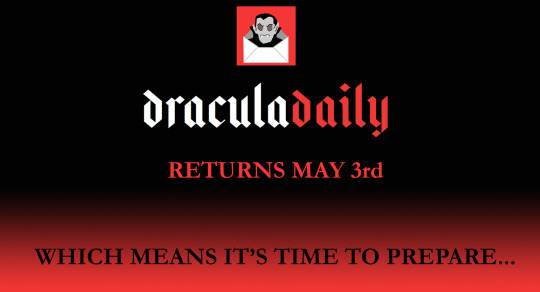
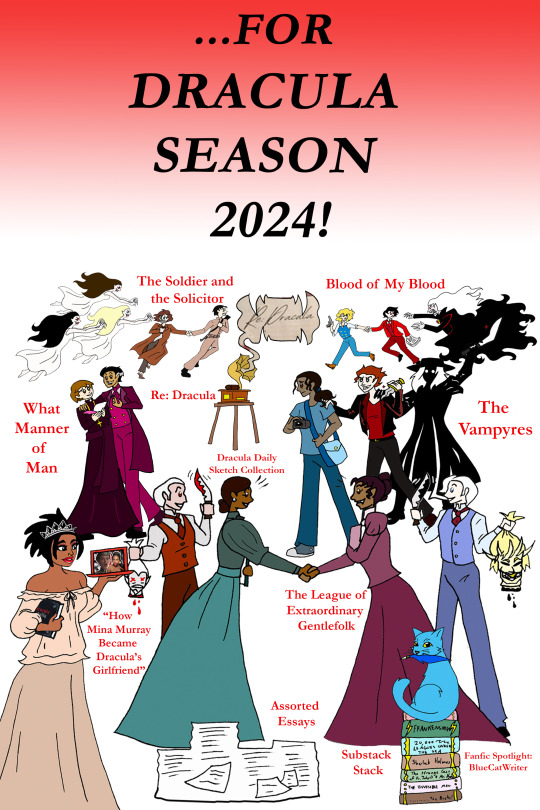
Our good friend Jonathan Harker is getting ready to leave for his business trip, Mina Murray is picking out a new journal, Lucy Westenra is charming a gaggle of smitten suitors, Abraham van Helsing is wrapping up his lectures, and Castle Dracula is prepping the guest room for a very long stay.
Which must mean that Dracula Season is here again!
‘Dracula Season’ being a catchall term for the voracious reading, memeing, writing, illustrating, analyzing, and general fun-having that’s ensued since Matt Kirkland’s project, Dracula Daily, caught on with us back in 2022. The Substack had already been running before then, but it sparked a conflagration as time went on and readers old and new to Bram Stoker’s Dracula—the actual novel, not Coppola’s fanfiction—devoured it in a way that scratched an itch none of us knew we had. Stoker wrote the book in epistolary fashion, clumping sections together as needed for the pacing without perfect adherence to chronological order. Matt went ahead and put all the events in order and proceeded to set up a lovely chain of emails that delivered entries on those correlating dates.
This style of organization and pacing turned out to not only make the virtual book club that much easier to engage with, but left space in-between to stew on the story and relate with the characters themselves. Every day of waiting in the book feels weightier when you have to pace and sweat and worry in tandem with poor Jonathan trapped in the castle or Lucy wasting away or Mina running out the clock before she loses the fight for her own humanity. And while we sat with the story or the lulls between Dracula Seasons, some of us found ourselves craving more of that ghastly gothic horror goodness to the point that we figured:
“Well. Why don’t I make something?”
And then we did! Tons of creative works have been churned out in the wake of Dracula Daily’s high. I figured that while we’ve still got a bit of time to wait for May 3rd, we should check out all this new stuff in the meantime. (Plus a handful of neat stuff that just clicks with the Dracula itch overall.)
So, in the interest of Dracula Season pregaming, let’s take a look at…
FICTION
Blood of My Blood – A recent addition to the Dracula Bad Ending AU pile, and definitely one of the most harrowing and addictive group-produced narratives I’ve ever come across, Blood of My Blood is the dramatically gothic currently-WIP work of @ibrithir-was-here and @animate-mush’s devious design. Give or take a heap of other fascinated folks (hello!) adding ideas to put more Horror into the Horrors that our cast has to face. The premise:
The Transylvanian climax went fatally sour and the Harkers were forced to shelter with Dracula himself, including their half-vampire son, Quincey. Cut to two decades later, and Quincey finds himself out in modern London, smitten with Lu, adopted daughter of Arthur and Jack, and diving into certain bloodstained old documents that detail the real history of how his parents came to live in the castle. Said revelations coming not a moment too soon, as a storm is coming for him straight from the Carpathians…
Dracula Daily Sketch Collection – An array of illustrations that captures every entry beat by beat, the Dracula Daily Sketch Collection by Georgia Cook, alias @georgiacooked was dished out over the course of the last Dracula Season. Some of the most fun character designs out there.
Fanfiction Spotlight: BlueCatWriter – With a whopping 99 works devoted to the novel Dracula (so far, the number may have gone up since I blinked), @bluecatwriter is one of the most prolific and talented fanfiction scribblers out there. Romances, nightmares, and overlaps between the two seem to crop up the most, give or take a crossover. Seems fitting that those blue paw prints have contributed to BoMB too.
The League of Extraordinary Gentlefolk – An ongoing comic in which all your favorite characters from the Classics section get together and tackle some perils ranging from the mundane to the monstrous. Started by the amazing @mayhemchicken and posted on @lxgentlefolkcomic, this series is a love letter to beloved Victorian era lit, with a spotlight on the two couples leading the League. Namely, the Harkers, ala Dracula, and the Nortons, ala Sherlock Holmes,’ “A Scandal in Bohemia.” Mina and Irene are the driving investigative and steering forces here, and still deeply in love with their likewise-infatuated husbands, just like in their canons! What a concept! Alan.
Without spoiling the full character list, just know there are going to be a ton of familiar faces roaming around before you finish reading the first arc. Said arc having conveniently wrapped up just a few days ago! Give the comic and its bonus silliness a look if you’re in the mood for a new comfort-adventure epic.
Re: Dracula – Probably the most well-known and incredible thing to come out of the initial Dracula Daily wave. This podcast is a full audio drama that follows the same format as the Substack, with episodes coming out in time with the entries themselves. And it has an unfairly cool soundtrack. They have a Tumblr with @re-dracula, a site and a Patreon to check out before the series kicks up again on May 3rd. (Also, keep an eye out for their next work, an audio drama in the same style with Carmilla.)
The Soldier and the Solicitor – Another treat from @ibrithir-was-here, this one involves a bit of time travel trouble. Quincey Harker has stumbled out of World War I and into the same dark forest where his father once fled for his life…then runs into the man himself, on that same night. Jonathan Harker, young and starved and lost, who has no choice but to trust this stranger while the Weird Sisters are at his heels…despite said stranger having no shadow. It’s a tasty emotional trek, already complete on Tumblr, but now it’s turning into a Webtoon. While Ibrithir is juggling a number of other stories, she’ll be redrawing spruced up versions of the comic and adding a few new scenes as things unfold.
Substack Stack – You know what’s better than one emailed-out public domain book club? A mountain of them. Just. So, so many of them. You’ll see that a lot of these are finished, but some are still ticking along. Either way, they’re all great picks if you’re craving some more old school lit to fill the void between undead emails.
Frankenstein Weekly – Frankenstein
Jekyll and Hyde Weekly – The Strange Case of Dr. Jekyll and Mr. Hyde
Voyage of the Nautilus – Twenty-Thousand Leagues Under the Sea
Letters from Watson – Sherlock Holmes
The Invisible Mail – The Invisible Man
Letters from Bunny – E.W. Hornung’s short stories of the eponymous Bunny and Raffles
Letters Regarding Jeeves - P. G. Wodehouse’s Bertie Wooster short stories, including the novel, Right Ho, Jeeves
…
……
………
…The Beetle Weekly – The Beetle (NOTE: Do Not Read This.)
The Vampyres – A novella I finally wrenched through the gears of self-publication as of March this year. Starring a petite but powerful paranormal cast, The Vampyres, centers on an unscrupulous undead fellow who finds that the revenants of the world are being mowed down by an entity known only as ‘Quinn Morse.’ Between trying to save his neck and figure out where the shadowy bastard came from, the Vampyre in question crosses paths with a new paramour and handy human shield in the form of a grieving Good Samaritan. He’s even polite enough to invite the Vampyre into his home while he’s in dire straits! Surely this will end well. All the info is available here and a little author site is over here.
What Manner of Man – This is the one made for everyone who started out hoping there’d be a real love story with our good friend Jonathan Harker and the Count when he was at his most charismatic. Where that sea of wonders dried up into a mire of horror, What Manner of Man by @stjohnstarling keeps things firmly on the romantic tracks. This Substack stars the letter-writing priest Father Victor E. Ardelian as he finds himself meeting with one enigmatic Lord Alistair Vane. It isn’t long before interest turns into intrigue and intrigue into undead intimacies.
The entire novel has been completed—along with multiple epilogues in the author’s Patreon, allowing readers to choose for themselves just how the uncanny romance plays out in the end—and the Substack now has a number of other gothic goodies piling up in the meantime.
NONFICTION
Dracula Daily: A Unique Reading Experience: This one comes courtesy of @realwomenofgaming. It’s a short and sweet piece that amounts to a fun snapshot of the entire Dracula Daily ride. A cozy couple-minute read.
‘Dracula Daily’ is the One Substack You Need a Subscription To: Features my favorite Matt Kirkland interview. @mattkirkland, if you’re still floating around on here, thank you for dispatching our vampire newsletter again this year.
Dracula Daily is Tumblr’s hottest new book club: Alright, the ‘new’ part is worn out by now, but this one is still a delightful article to swing back around to. Two years on, this Polygon piece is a time capsule of those early months when people outside our bookworm bubble realized we were all happily receiving letters from our favorite classic gothic horror blorbos.
“How Mina Murray Became Dracula’s Girlfriend” – Princess Weekes, if you ever read this, thank you, thank you, thank you. I am sending oceans of love and millions of rewatches to your video essay. If you haven’t seen it yet, “How Mina Murray Became Dracula’s Girlfriend” is one of the most refreshing and well-made breakdowns of both the title subject and numerous other issues that have proliferated in the public view of Dracula’s cast and plot as adaptations endlessly warp or outright bastardize the actual novel. An incredibly cathartic watch.
Literary play gone viral: delight, intertextuality, and challenges to normative interpretations through the digital serialization of Dracula: A mouthful of a title for an even more elaborate article about the Dracula Daily phenomenon. This one is a full-on study that analyzes just what happened within the big bloodsucker book club surge and how its ‘wandering reading practices’ enriched the experience for participants.
“The Undying Undead: An analysis of the Dracula Daily community for a theory of online community formation and interaction” – We have a thesis on here! Look at that! @sirangelothebestest’s MA thesis used our vampiric book club as the bones for a massive brick of an academic piece that definitely deserves a look.
…And I think I’ll go ahead and cap things here.
This isn’t everything I got recommended, but if I had squashed all of it in here, I think folks’ eyes would start to fall out of their head. I hope you can find something cool to comb through here. Or, if there’s something great I overlooked, tack it onto the list! We’ve got just two weeks to go until we’re off with Mr. Harker. Let’s enjoy our respite before those castle doors close behind us.
#time for Dracula Season pre-gaming :3#thank you to everyone who sent in their suggestions!#dracula#dracula daily#re: dracula
1K notes
·
View notes
Text
Voltaire's Prayer
“I have never made but one prayer to God, a very short one: Oh Lord, make my enemies ridiculous. And God granted it."
-Volaire’s letter to Étienne Noël Damilaville, 16 May 1767
I’m inordinately fond of sex, in the political sense. It’s saved us so often from the worst parts of ourselves.
As far as anti-authoritarian elements of the human experience go, sex is right up there with curiosity and the search for truth- maybe even more so. When a new tyrant comes to town, shutting down the universities and the libraries is only the second thing they try. The first thing is to regulate human sexuality to within an inch of its life. Rules for marriage, rules for courtship, rules for which genitals may touch and where they may touch and when they may touch. Rules for who and rules for whom. Rules for which kinds of sex must doom characters in literature, rules for which things may be described as sexy, rules for which things may be described in a sexy way.
Of course they do! If you’re trying to bind a large polity together under a common ideological narrative, to render people predictable enough to quash dissent and legible enough to exert power through them, the last thing you need is a bunch of folks running around being horny about stuff without permission. Nature gifted us with a great capacity for reason and community; we have the innate opportunity to learn about ourselves and our neighbors, and to form complex societies based on that understanding. It was Aristotle who first called us the political animal, and the fruits of that extraordinary capacity will always be within our reach, if only we can come together within a shared understanding. The invention of the city is the great triumph of our species, and with it we conquer the universe.
But also this extraordinary, reasoning mind has been sculpted from the raw clay of a biology that’s anchored in sexual reproduction, and this ends up being very, very funny.
The problem isn’t so much that the sex instinct exists, per se. It’s how it’s implemented. Like most biological forms, the full complement of 86 billion(!) neurons in your brain aren’t encoded in a particular configuration; the brain is much too complex to be described so precisely in the only ~725 megabytes or so of human DNA. The particular shape of your brain is in there somewhere- the lobes and subregions responsible for vision, memory, cognition, all that- but only up to a point. The genius and fundamental limitation of genetics is that, below a certain level, the genes instead describe a process for the production and reproduction of specialized cells, and simply constructs them in such a way that they can be relied upon to order themselves as they go.
This is all well and good when we’re talking about kidneys and livers, but the fact that you can encode any kind of specific behavioral instinct in a brain this way is nothing short of a minor miracle. Think about it! Spiders don’t have a ‘spider web’ gene, the gene is for ‘proteins that come together in self-assembling electrochemically sensitive gelatin tissue which, when complete, encodes patterns that operate organ systems such as legs and spinnerets in such a way as to reliably create silk webs.’ This is absurdly impressive, and also completely insane.
What I’m getting at is, powerful behavioral instincts in a complex animal aren’t precise instruction manuals by which we pursue evolutionarily advantageous behaviors. Sex and eros are prior to logic or language, let alone strategy. Sex is a double-thick electrical wire discharging lightning bolts right through the middle of our cognitive centers, installed in the brain by a surgeon wearing mittens. It’s an untethered firehose whipping chaotically through the cathedral, unpredictably spraying golden reliquaries with substances unmentionable. It’s the first and greatest anarchist.
I really can’t overstate my gratitude for this.
Obviously this results in any number of deeply goofy outcomes by way of kinks and odd sexual practices- it gets tangled with pain centers, with random bits of anatomy and proprioception, with our taboos and aversions, with our greatest terrors or our greatest yearnings or just arbitrary stimuli from adolescence, and of course it gets enmeshed so often with our notions of power and submission. It imbues these things with a fascination and potency out of all proportion with their mundane meanings. And ultimately, you end up with human pleasures and human values that diverge so far from banal evolutionary imperatives as to be all but unrecognizable.
Even when this process somehow manages to propagate through the brain in such a way as to drive behaviors that are legibly aligned towards some adaptive constraint- e.g. heterosexual mating practices resulting in biological reproduction and careful childrearing- it’s still madness. Love and sex penetrate deeply across tribal and national and racial boundaries, across economic interests, across battle-lines and enmities. We become traitors, apostates, emigrants, and artists. Declare a law, and in short order some hot-headed young people come along to break it in the name of sexual passions you could not possibly have seen coming. Divide your neighborhood into us and them, and by the time the ink is dry on your proclamation there will be a forbidden relationship across the fence. There is no social order, no ethical system, no theory of human nature that can entirely withstand contact with the full spectrum of human sexuality, because sex and eros are always going to be exactly as bonkers as the complexity of the human mind and culture will allow, plus a little extra just to be sure.
This isn’t always a delight, of course. Many prohibitions exist for a very good reason, and the chaos of human sexuality makes no exemptions for true evil. Some of us end up really, truly victims of this process. But for all the dangers, the chaos at the root of all this isn’t oriented towards evil. Chaos just means chaos, essentially arbitrary and hence absurd in character.
And in the grand analysis, we are so lucky to have this thing moving through our communities, this ridiculous madness that guarantees that there will be cracks in every wall and slips exploding cigars in the pockets of the powerful few. Not in everybody as individuals, of course, and not everybody the same amount; asexuality is certainly one of the outcomes that all this mad gallivanting through our brains can produce. Sexuality would never be so predictable as to guarantee its own existence, after all. That’s part of what makes the joke so funny.
But all of us, regardless of sexuality, get to live in a world where the grand anarchy of sex is constantly driving home this lesson that no category is inviolate and no law is perfect. That we should not and cannot take ourselves too seriously, or forget that we’re animals. That we don’t exist only for the sake of others, or within their understanding. That cities are made of cooperation, grace, and forbearance- not conformity or mere compliance.
People sometimes worry about immortality. In the political sense, I mean. They worry about eternal dictatorships and unconquerable gerontocracies. This fear isn’t entirely unjustified; death has often played a role in progress and liberation. But as long as enough of us are still getting horny without permission, still falling in love in stupid ways, I think we’ll be okay. Romeo and Juliet don’t have to die at the end to make a difference in the world, as long as they’re brave enough to get weird with it.
619 notes
·
View notes
Text
One thing that’s really rubbing me the wrong way about some people’s reaction to the ending is the way people are talking about Wille. I see comments that essentially imply he is nothing without his privilege backing him, that he has no personality outside of his relationship with Simon and he’s gonna be in for a rude awakening after the ending when he realizes the attention on him isn’t gone just because he’s giving up the title of Crown Prince and life as a normal person isn’t going to be an easy or smooth road.
To me it seems like the message has completely gone over some people’s heads.
No part of me felt while watching the ending that everything is now resolved and Wille will live happily ever after without any adversity ever again… No?
The point is he finally has a choice where he ends up.
Wille literally explains this to the Queen in the final scene - that he’s never felt like he’s had a choice. He didn’t choose to be born into the royal family, and as he points out to his mother, neither did she. The public didn’t choose who inherits the crown. None of them chose it. Wille wants a choice. By staying in this role and doing what is expected of him simply because it’s his birthright is exactly what Wille is actively fighting against.
Another common thread I’ve seen thrown around is that Wille has no personality outside of Simon and I think people need to realize that one’s hobbies and interests do not define their personality. Wille very much has a personality and he had one before he met Simon - he’s always been the type to question the status quo and why things are the way they are. In season 1 episode 1, before Wille meets Simon, we see Wille scoffing at being made to mingle and pose for photos with people he doesn’t know and we see him telling Henry and Walter they’re allowed to have their own opinions when they mindlessly agree with everything he says. If anything, he starts losing this side of his personality because of the restrictions the crown puts on him. Wille falling in line with his expectations throughout the series takes him further away from this side of himself that’s always been there. We see how detrimental this is not just to his relationship with Simon, but with Wille’s relationship with himself. How exactly is Wille supposed to find what he’s passionate about when he’s consistently being told that these are the things he should care about, this is how he needs to look to the public? This is all a very intentional narrative choice to demonstrate why Wille staying in his role is detrimental to his mental health and his ability to grow personally.
The ending is not saying “everything is fixed now and Wille will have a totally adversity-free life with Simon.” Nothing is fixed and nothing is certain, but at least he made a choice. He’s going to stumble and he’s going to continue to make mistakes and a life path is not going to construct itself for him, but at least he now has a choice. He doesn’t have to pick a hobby or interest that’s considered suitable for him. He can get tattoos if he wants to. He can get married or not get married. He can have kids or not have kids. He can go to university and study whatever he wants, and yes, he will still have his family’s money. He’s not gonna be destitute and that is indeed a privilege that Wille is aware of. Should he stay in a role he doesn’t want simply and that makes him miserable because he’s privileged? For all we know, maybe his family will cut him off and he’ll literally be on his own, and that’s a risk he’s willing to take to be, in his mind, free.
The public is not suddenly going to lose interest in him, but at least he won’t have to concern himself with the royal court dictating how he and Simon act or appear. He will no longer feel like he needs to control how Simon conducts his social media presence. It’s very clear in s3 that Wille is not personally upset with Simon for posting the song or the picture with the little boy at the worker’s March - he smiles when he sees it - but that he’s worried what the royal court is going to think about it.
As far as the idea that Wille giving up the crown at the end was indeed for Simon because Wille has no identity without Simon, I really don’t think this is fair to say at all, because Wille was unhappy with his position even before he met Simon. He hated that he couldn’t even do something silly and reckless without issuing an apology. He hated that he had to uproot his entire life because he made a mistake and his family was trying to save his image in the eyes of the public. The thing is, before he met Simon, and before the events of the series, Wille didn’t feel like he had a way out, and funnily enough, that’s for the exact same reason people are dunking on him for now - because it’s the only way of life he knew. He didn’t see a way out and it’s through being with Simon that his extremely narrow view of the world gets challenged and he’s finally able to see a way out. Did Simon inspire him to do what he did? Of course he did. This entire concept is materialized through the scene where Simon tells Wille that he never had a choice who he was born as and that he sees how the monarchy makes him feel. To say that Wille gave it up for Simon implies, to me, that Wille would’ve been happy in the role if not for Simon, which I don’t believe is true. He’d still be miserable but perhaps feel less like he has the agency to do things about it. Getting to be with Simon at the end is certainly a big part of why he did it, but that also just kinda goes hand in hand with his own personal freedom, doesn’t it?
I find it kinda funny how much the internet preaches that it’s never too late to figure out who you are or what you wanna do and I see people acting like Wille is somehow doomed because he’s a 17-year-old without any interests or hobbies. Wille’s entire struggle is with having his life completely mapped out for him and it’s like with him giving up his role people are now questioning the fact that he doesn’t have an entire life mapped out for himself. I spent my time when I was 17 blogging on tumblr and doing nothing else and didn’t go to college until I was 24. I’m 29 now and I’m still learning what I’m passionate about. To treat Wille’s lack of hobbies or interests as some kind of moral failure or indicative of a lack of personality really, really bothers me and to me his lack of interests and hobbies has always been a very intentional writing choice, and the ending, if anything, gives him all the time in the world to figure that out. He might even develop an interest and then realize it’s not for him! The amount of people I know that went to college for what they thought they wanted to do then dropped out because they changed their mind, or graduated from school, couldn’t find a job, and then went back to school for something else is endless. This is all part of the human experience and it’s going to be an entirely new journey for him, but that part of his journey did not a part of this particular story, and in that way, the ending is open. It also helps that regardless of Wille’s wealth and privilege, education in Sweden is FREE.
In the end, the message of the ending is exactly what Boris said to Wille in season 2: we can’t choose who we are born as, but we can choose how we want to live, and that’s exactly what the ending is saying, and that’s what Edvin meant when he said the ending is open. Wille’s road is not suddenly going to be perfect and easy, but at least all of his choices, including his mistakes and struggles, can be entirely his own.
434 notes
·
View notes
Text
The summer that was never supposed to end
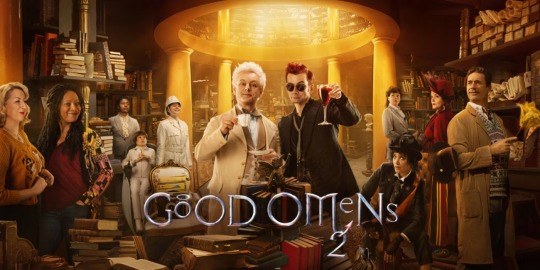
You’ve probably noticed how in Good Omens 2 Crowley’s eyes are brighter, more saturated, as if glistening with liquid gold. We’ve already covered his hair. And it’s not only the visual aspect of him — even in objectively stressful conditions, Crowley appears mature and put together, way cooler and more protective than before. Even his faults are heavily romanticized in the past and present scenes, reminding of the S1 body swap, when Aziraphale projected his love to him on the way he played the demon in Hell.
It’s not just the demon. The whole season is more vibrant, bolder, filled with sunshine. Just like a summer that was never supposed to end. Like a memory of a loved one seen through the eyes of someone who thinks of them every day until the end of the world.
S2 seems ridiculously saturated, whimsical, and full of red and gold, just like a certain demon. Aziraphale not only painted his bookshop in his image, but literally colored the whole world in Crowley’s colors. It was such lush and saturated and blooming with warmth and hazy light.
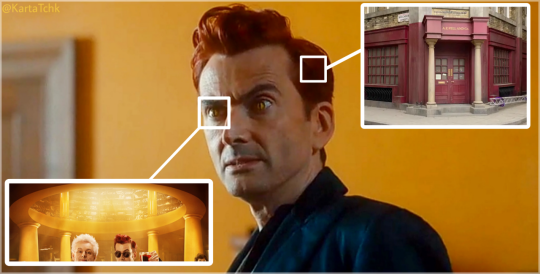


It’s either that all the newest events are just another memory seen through a certain angel’s eyes, or said angel actively made it appear this way — as in, his feelings grew so strong that they’ve started to warp the reality around him. And it’s a well-known fact that Aziraphale has a tendency to affect his surroundings, either unconsciously, when his presence in the bookshop literally lightens up the sky seen through its windows, or very much consciously, when he takes over the position of a master puppeteer and manipulates people with or without the help of his miracles.
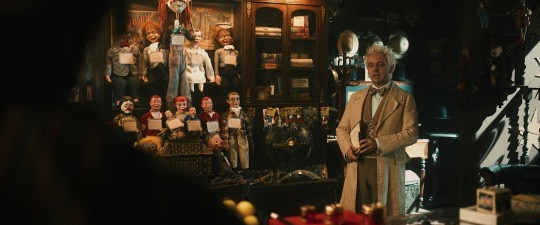
S1 was more dramatic and apocalyptic, but not particularly gray — at least not as much as the color grading typically used in portrayal of similar apocalyptic narratives. S2, at least as seen through Aziraphale’s own La Vie En Rose lens, is vibrant and saturated. And those colors drastically fade in the heavenly light of the elevator during the credits, suggesting that they won’t be as visible in the course of S3.
But I don’t want to ramble about the apocalypse sandwich and the three-act structure here, so let’s circle back to S2.
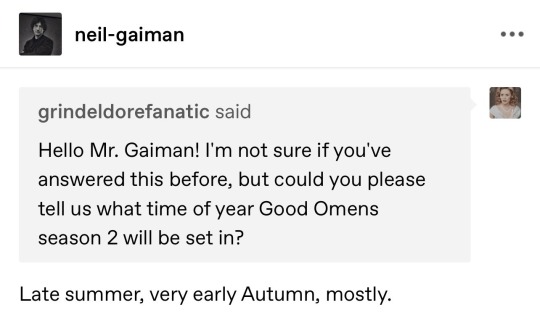
Good Omens 2 was really set in a summer that was never supposed to end. But it did, autumn crept in, and there was no chance of hearing the nightingales sing. They all had left by the time an angel and a demon finally kissed.
In the most literal sense: the very last nightingales usually migrate from the UK to their wintering grounds in Sub-Saharan Africa in the first days of September.
Aziraphale was right that nothing lasts forever — and the passage of time on Earth is marked by subtle details invisible to the immortal eyes.
The main thing about autumn migration is how sudden and hard to predict it is. The birds start disappearing gradually, often without notice, until at some point they are no longer here. Much like the angel leaves the bookshop — their shared nest — to spread his wings and fight.
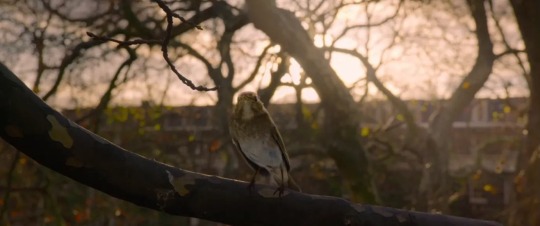
And it was basically announced on the poster.
Can you see the migratory formation of birds up in the sky? It looks like Aziraphale is the last one to get off the ground and fly.
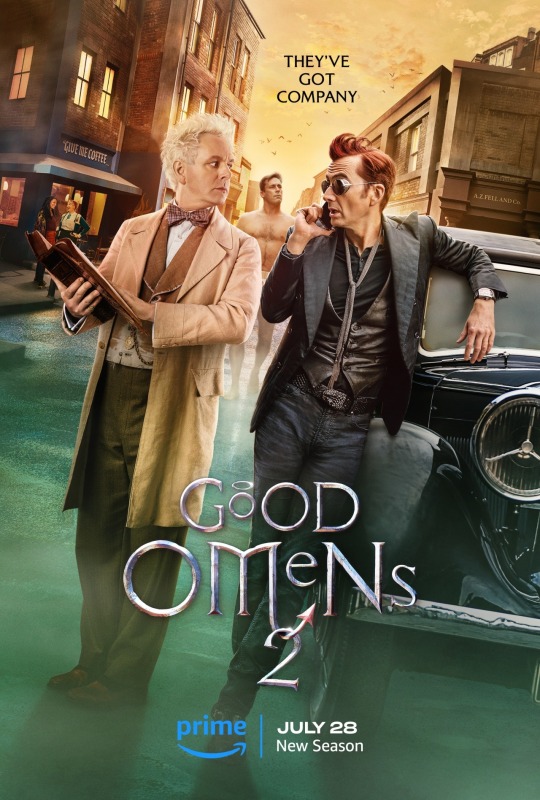
#Yuri is doing her thing#good omens#good omens 2#go2 spoilers#go2 meta#good omens meta#no nightingales#in the most literal sense#ineffable husbands#ineffable divorcés#crowley#aziraphale#your friendly neighborhood eldritch horror might be messing with more than your life#the summer that was never supposed to end#the good omens crew is unhinged#everything is connected
1K notes
·
View notes
Text
this is a personal vent post so please let me just get it all out without trying to come at me lol:
so many ppl saying they respect larian's decision to peace out and not deal with hasbro/wotc, but i have to be honest, i don't respect them at all.
they are leaving a game behind that is unfinished and a narrative mess.
they leave a game behind where everyone paid the same amount of money for it, yet depending on which character you prefer, you get less content.
the disparity between everyone else and their writer's pet ast*rion is insane. he has a half to a third more content depending on which character you compare him to.
they leave behind a sparse act 2, which is already so barren compared to act 1 and all it had to offer. act 3 is a narrative mess and lacks structure.
they leave a game behind where they made promises a handful of weeks before release where they ought to have known that they, in fact, will not be delivering said promises: access to the upper city, consequences for playing certain races across the acts (playing a drow is going to be different in act 1 and gives you advantages vs act 3 where it would give you understandable disadvantages), etc etc etc.
they leave behind a game where content was cut from the companions to make it seem like the origins have something to offer when that system is barely able to compare what origin playthroughs offered in dos2 and it hurts the game and the experience (like tara being cut for companion gale).
they leave behind a game where they promised to much variety and proclaimed in panels from hell how they struggled to show the width and depth of the game, but really? it's about as deep as a puddle. a lot of the choices do not matter. kill ethel? nah, she's alive and well in the city. no sister hags to be angry here. give karlach no infernal iron and never talk to her at all? doesn't matter, she'll survive until the end of act 3 and will still call you her bff. dissuade gale to use the orb? we'll make sure he'll still offer 3 more times just in case. send yenna away from camp bc you don't want her there? doesn't matter, she'll stay. and yes, i'm aware these are all small things, but they are part of a larger problem. almost nothing you do truly matters to the point of where i just skip most things in act 1 and 2 now.
they leave behind a game that they promise to still patch, but some things have been broken since early access / release to the point of where i'm like i'm sorry, but your word that you will continue to patch things means about as much to me as all the other empty promises. the dialogue about morena dekarios is still broken and it's been over half a year now. the astral sea scene has low-res body textures for months. i know from mutuals who love minthara that her romance is still broken. and i could go on and on.
and what gets me the most about this is all is that they have learned nothing at all from dos2: act 3 of that game was so bugged and all over the place that i couldn't muster up the motivation to finish it the first time i played. they neglected a character to the point of where he could have been removed from the game or made a general hireling (beast).
those issues were at least attempted to be fixed in the definitive edition.
with swen saying that there will be no new content anymore and stating that both bg3 and its characters are now property of wotc/hasbro, it seems unlikely we'll even get an attempt of a fix.
so what this boils down to to me is just another game company not delivering on their promises after overselling their product and more or less abandoning it after a year to move onto the next big thing.
i don't think i can respect that ngl.
262 notes
·
View notes
Text
SPOILERS FOR GOTG VOL. 3 - DON'T READ IF YOU HAVEN’T WATCHED IT YET!
I have a feeling that everyone (who calls themselves fans) that didn't get the meaning of the ending in GOTG Vol. 3 has never read a single comic of them or is only a fan of some characters/relationships. Many complaints I've seen are about the end and Gamora and Peter’s romance, which sounds kind of childish. You don't need to agree with me, but I’d like to elaborate on that.
James Gunn's writing is always about the detail of things and he is not afraid to do something “bad” if it is the best for the STORYTELLING. This is what most of these people don't get: the most important part of these movies is the story they are telling. The characters help the movie tell the story, it's their story after all — but there's no protagonist or greater good that puts them above the narrative.
(This is different from Gamora’s death in IW btw. It was not the only way they had to make the story flow; they just wanted to “humanize” Thanos and by that, they chose to kill her character. It was an action ADDED not CRUCIAL to the story.)
Vol. 3 is about found-family and growing up; finishing cycles. They will always be family, as we will always be part of their story (that’s why we understand Groot now). However, life chapters end just like in real books, and these Guardians as a TEAM “chapter” has ended for them and for us.
This is very common in the comics. Most times they are all separated, doing solo missions, until something goes wrong and they reunite again. They never stop being friends, why would it be different in the movie universe?
But the end suggests they are not family anymore.
Did we see the same film? No, it doesn't. We can see that in James’ subtle writing: the way they all still respect each other, their understanding of one another, and how they all would die for themselves if needed. That won't change just because they are not physically together — just like when you finish school you won't ignore your best friends, even if you create new relationships (which you will).
But Gamora is not part of the family anymore.
Well, if you see it this way, I can't change your mind. What I can say is that the story IMPLIES that she still is, in fact. And the number one clue is that she (in 2 days) understands Groot. Remember, we also understand him because the fans are now part of the Guardians family — so understanding him and being family are correlated.
Anyhow, I know this is not enough for most people, so hear me out: Gamora’s arc is about respect and healing. She starts the movie skeptical about working with the guardians — she just wants the money— when in reality, she acts like this because she is AFRAID and feels PRESSURED to be around her “old” family.
Imagine: you died but then another version of you comes back without knowing anything of your present life. People will expect you to act in a certain way that maybe you started to act after you met them; they will expect you to like certain things you don't know of; people will EXPECT you to attend to their needs. It is a lot to swallow at once. You are afraid because you don't know them, you don't think you deserve all this love and commitment out of nowhere. So you run away. You run away to find things on your own, to grow out of this pressure you feel and discover the whole universe of possibilities you have ahead.
That's what Gamora did. But then, the mission went south and now she is stuck with her “old” team. The film shows us her character exploring the ship, listening to music... trying to understand them. At one point she even says to Rocket “You must be a very loyal pet for them to do all this for you” (or something similar). This is her way of putting into words how she visualizes the current scenario she was put in. Slowly she recognizes that they are a family, and by the way they act she finally gets how and why she also must have loved them in the past.
She goes from “I don't give a fuck”, not open to them, afraid and pressured to “I bet we were fun”, understanding and respecting them, even fighting for their family to survive.
(If she still didn't give a fuck she wouldn't have fought for them and with them when she could have just run away again.)
But she has already created new relations, so she goes back to those for now. It is what she is familiar with in this timeline. Does that mean she will never contact the guardians ever again? NO. Remember: James’s writing is about DETAILS, nuance. She is open to them again, and the final part of the movie shows this to us, especially her last interaction with Groot, Peter, and Nebula being friendly.
Oh, but Peter and Gamora will never be a couple again, their romance ended when she went back to the Ravengers.
… Again, if you see it this way I can’t change your mind. What I can confirm is that she doesn’t close herself to the team — especially to Peter — in the end.
When she says “I bet we were fun” it's the first time she acknowledges their former relationship without distancing herself from it. She could've said “I bet you were fun” or “I bet she was fun”, but instead she prefers to include herself with “we”. She pauses before letting go of Nowhere, stopping before entering her ship — what moves her forward is Nebula, who can see her sister’s changed attitude but still encourages her to take a step forward and go explore the galaxy, because she knows Gamora is not mature and ready yet for those feelings; just like she wasn't ready to be openly sentimental when Gamora joined the Guardians back in 2014.
And Peter is also not ready. Just like Gamora needs to find herself again and discover who she is, Peter needs too. He is lost without her after IW, we can see it during Holiday Special and in the beginning of Vol. 3 when he passes out because of alcohol abuse. Both don't know who they are in this new reality — and they will only find out with time. Time heals and reveals.
In the end, Peter doesn't have the same thought as in the begging: he doesn't want her to be who he once knew, he wants her as she is, this new version whom he still loves so much and wants to know more of. Although he wishes she could stay, he knows that she has her own time and while she learns about herself he will go do the same.
So yes, they’re not explicitly together as a couple in the final scene — neither they kiss nor make out, whatever you believe a relationship is made of — but they’ve changed and are open to one another. The last scene does not appear to me as an “I’ll never see you again”, but as a “Goodbye, see you soon”.
(Aside from all the small bits we had through the movie of a developing relationship between them; my favorite one being when Peter activates the auto-destruction code and Gamora smiles at him.)
Besides, you can't force anyone to fall in love in 48 hours!!
Yes, I also have some minor complaints about the story, but I can recognize that — with all the turbulence the characters and the production faced in the last few years — it was a satisfying end with a limited amount of time to a badass trilogy. The end is definitive but also open to future possibilities for all our favorite characters in their universe — some we might never see and it will only be to our imagination.
Again, you don't need to agree with me, but I had to do this, or else I would implode with thoughts. Thank you if read up here! My ask box is open if you want to talk more <3
#gotg#guardians of the galaxy#guardians of the galaxy vol. 3#gotg vol.3#gamora#peter quill#starmora#nebula#rocket racoon#groot#drax#mantis#all the other guardians#I had to do it I'm SORRY#I can't bear it anymore#people need to stop thinking every story has a happily ever after#Besides that has never been how James Gunn wrote their story#it's not his style to do something so blatant#it hurts me to know this chapter is over but that's life and that's growing up#now to fulfill my starmora heart for example i’ll open AO3#that's what we do we imagine the future and support our local writers#Sorry for any misspelling errors#English is not my 1st language
1K notes
·
View notes
Note
My God I love your depiction of the Wittebane brother ❤️
Do you think there might have been a chance that your Pip wouldn't kill his brother when Calec goes to Demon Realm? He seems way more tolerable of weirdness and is actually curious about the taboo things. That it makes me wonder if other steps were taken by people around him, maybe he would make different choices and not turned into a brother-killing genocide goop man. Obviously, the blame is still his for what he did, but I can't stop wondering what if.
And him getting along with Evelyn instead of hating her right of the bat is really cute.
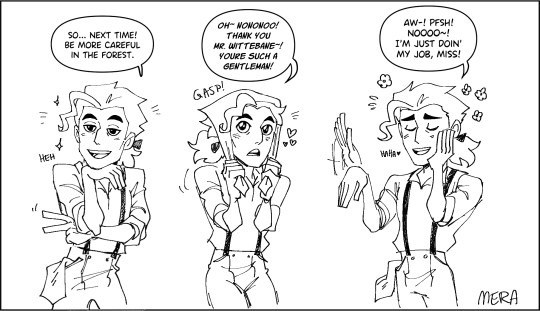
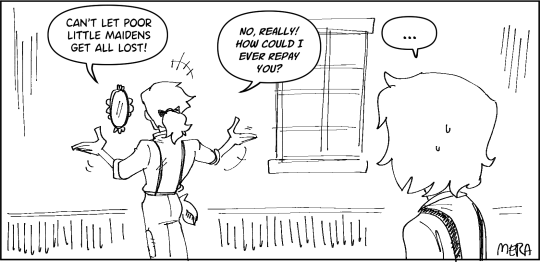
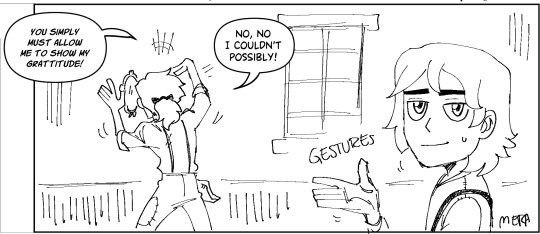
Thank you! :D <333
He grew up with this theatrical bisexual of a brother. Pretty sure the reason Belos didn't give a hoot on the Boiling Isles about queer stuff is because he kinda knew, and accepted, that Caleb was kinda queer. In some cases, people can ignore or bend certain rules for people they love. Even disregard them or pretend they don't apply or exist.
(long rant about writing and narrative foils and blah blah under the cut)
Unlike Caleb, I think Philip is the sort that only picks-and-chooses whatever rules he feels will supports his personal wants/thoughts and tosses the rest.
Caleb was not hiding it as well as he thought he did. lol.
I think that, sure, there was probably a turning point for Philip.
And absolutely, people around him influenced him. He's just a kid, a vulnerable one at that, in a protestant Christian cult.
I kinda like to think of it as a corruption arc. Mostly because it seems (to me) that the whole reason Luz was meant to have a depression-arc and Philip getting all "YoUrE JuSt LiKe Me!" thing was because.. There was supposed, I think, to be similar beginnings for them.
But Luz, in season 3, got depressed and felt a lot of guilt, so her arc is going from this happy-go-lucky kid interested in different things, to a depression arc where she questions herself. While Philip has a corruption arc, where he gradually goes from a well-meaning kid interested in different things, to evil and delusional.
I am also combining Luz, King, and the Collector into Kid-Philip's themes.
King is fascinating as a pre-narrative foil for kid-Philip. I think. As King was very clingy to Luz and didn't want her to leave, he too had a delusion about his own importance (disregard that it was kinda true in the end there). King tried to dictate (in that book episode) about what his and Luz' book should be about, how it should go, and it really hurt Luz' feelings. In the end, they solved it. But as a narrative foil, I think for the Wittebanes, they probably had a similar struggle on a larger scale, and it didn't get resolved.
The Collector, too! They're desperate to be close with someone, anyone, who gets them and wants to play on their terms. Kinda like Belos wanting him and Caleb to be witch hunters. Not accounting that Caleb is his own person outside of him-- Which, if you think about it, Caleb made his whole life (in my version anyway) about taking care of Philip. So I'm sure Philip felt like he really was Caleb's entire world. And then suddenly he wasn't. Because of a witch.
The Collector, despite having this incredible power (just like Pip having his brilliant brain) is still a child and using their power in selfish ways. Not intentionally, I think, just out of a fear of abandonment or isolation.
I personally am in favour of nobody-is-born-evil-but-anyone-can-become-evil kinda thing.
I would like to explore how Philip gets corrupted.
I am slowly influencing Philip in my fanfic with little things that will, eventually, boil down to not so great moments.
The thing about delusions is that the person truly believes in it. Philip believing he's a hero has to make sense and feel believable.
Belos is a jerk. Philip isn't, yet. He becomes that jerk. But I don't want to write a sociopath. I also don't like using less-favourable mental illnesses as an "easy way out" to write why Philip became Belos and a genocidal maniac.
I have strong feelings about de-stigmatizing mental illnesses in writing, without romanticizing them or leaving out the really awful and less discussed sides of it. This includes diagnoses within all the clusters of the DSM5. I will not sit here and say I only support a diagnosis like Autism or GAD, and not things like Histrionic or Borderline.
And including people with MH issues and personality disorders is important, too, as well as not trying to downplay them.
People throw around Belos with things like Narcissism and Psychopath, without actually understanding what those means or what the different types there are. For example, is he a grandiose, oblivious or a fragile narcissist?
Yes, these disorders are looked down upon. A lot of people who have them aren't very nice people. But that doesn't mean they're evil or have no heart.
Lots of children can display early signs of these, and in a rough time like the colonial 1630s of America, it is not unthinkable that those rough times bred some dysfunctional people. I'm sure Philip has his own slices of pie as far as mental health goes, just like Caleb and many other struggling people.
But, I will not write from an angle that implies Philip just has darkness from the start in him.
There's a reason why I had Caleb go on a rant about being born evil in chapter 5. Because puritans, and Christians alike, at the time - truly did believe bastards were just... Half people. Did you know that if an orphanage found out a baby was a bastard, they wouldn't let it suckle the nursery goat's udders. Because they were afraid it would soil the milk and, in turn, might give the non-bastard babies bad influence. Somehow.
With that kind of logic in your culture, it's no rocket science that people would put nonsense together and think it made sense.
I'm much more interested in how puritanism and witch hunting culture influenced and corrupted Philip into becoming who he became, and why he refuses to budge on his beliefs to the point of murder.
As the owl house, the show, has commentary on systems influencing cultures in a bad and positive way. But in particular, the one Belos tries to influence the Demon Realm with; being a not-so-great way. So! With that as a clue: what made Philip turn bad, most likely, was partially the puritanism and its extremist ways.
I think TOH is also a bit of a nudge at the HAYS-code of Hollywood and how it has trickled into most all the American culture-core. As it's both trickled into schools, morality, politics and other things outside cinema.
Just pointing at him and going "He's a sociopath because he became a genocidal tyrant" is, to me, cheap. Not only does it further stigmatising mental illnesses by implying only a disorder can make someone do such evil things. But it also disregards the most horrific truth of all; that the true monsters are people not at all unlike yourself. And that they, too, were children once.
#ttocw#caleb wittebane#philip wittebane#toh#the wittebane brothers#the owl house#toh fanartthe owl house fanart#toh comic#wittebros#wittebane#toh caleb#toh philip
361 notes
·
View notes
Note
PLEASE elaborate on “davidelizabeth in alien covenant if i wrote it” they squandered her potential so bad !
okay so first all i have already talked about how i feel that covenant should have built on the sticky psychosexual gothic horror tension between david and shaw and developed it into a toxic codependent dynamic (that predictably ends poorly due to their fundamentally opposing ideological stances as well as one-sided obsession on david's side), so i'm going to attach that rather than rehash it.
but honestly if i'd written covenant i would have had elizabeth survive david long enough to establish herself on the engineer planet in hiding from him (following a "breakup" caused by his act of genocide), and have the arrival of the colonists in covenant be the catalyst that forces them to confront each other again and finish what they started. i'm not entirely certain of the specifics, but i think there's a lot you could do with the central themes of alien as a cosmic/existential horror (a story about horrifying revelations, terrible change and progress/evolution that is unrecognisable as anything but nightmarish to the human minds bearing witness), a body horror narrative focused on sexual assault, pregnancy and childbirth/parenthood, and an examination of extraterrestrial horror as this colonial mindset - the fear of being violently replaced by something that deems itself better than you and works ruthlessly to eradicate you from your places of safety which it has taken for its own - as well as the more prometheus-specific themes of parental trauma and religion (mostly christianity) by making the core conflict between david and his xenomorphs and elizabeth and humanity, like a sort of fucked up retelling of adam and eve in the garden of eden.
to tie up loose ends, since prometheus and covenant are meant to be prequels to the original alien films, i'd probably have elizabeth succeed in being the final girl (a parallel to ripley in the original franchise) but tragically go into self-imposed exile/die alone in an attempt to prevent the xenomorphs from being stumbled across by future explorers and becoming a threat again, as well as possibly out of some warped sense of guilt, both for having allowed herself to ever love david and believe him capable of change, and for failing to save him ("save" very much in the biblical sense, as in persuade him to share her point of view and abandon his descent down a dark path). needless to say, she doesn't succeed, making her "victory" all the more phyrric.
188 notes
·
View notes
Text
Spirit Work II
Spiritual Imposters
Before committing yourself to a deity or spirit one must communicate by learning about the entity in question, making certain they are who they say they are. Discovery of a spirit you thought you were working with is something else that leaves one feeling betrayed, upset, and oftentimes empty. Knowing the signs can really help discern things.
Mental Sock Puppets
A mental sock puppet is the result of talking to yourself and concluding self-talks as something else. The ego talks, you listen to yourself. Not a spirit. Or you establish contact but are incredibly biased hearing your thoughts. Not theirs.
It acts in accordance to your expectations.
You received no new information.
It’s only as knowledgeable as you are.
It only abides by your will. No one else.
It gives no signs unless you’re looking for them.
These are easy to get rid of if you identify the problem, recognize the problem, and let the narrative and ego go. No one needs to hear it. No one wants too either. You only end up hurting yourself and other people if things get too out of hand.
Lying Spirits
Some spirits are opportunists. They can portray an illusion pretending to be someone they’re not in order to gain loyalty and trust. They can take the form of a deity, guide, companion, or anything else that you would be most receptive to. This is why it’s good to know the basics to energy work and magick. Remember to learn different energies and how they feel to you. Remember to analyze the situation, yourself, the spirit, the environment, and working before proceeding forward. A lot of these malevolent entities like to feed off you or cause more drama that’s not necessarily needed.
Spirit Work and Continued Relationships
Veneration and Practice
This is about worshipping the deities or spirits you work with and highly depends on your practices and influences you choose to use and construct.
Most times there will be an altar setup or shrine dedicated to these spirits. Offerings of food, drink, incense, and trinkets would be a way of showing your dedication and interests of the spirits. There are other forms of interaction I have seen before.
Connection through art, music, nature, and meditation are just some of these other mediums. You don’t have to make this complex, and sometimes people have busy schedules making veneration hard to come by.
Try to keep things simple and remember it’s always okay to take a break due to circumstances. Spirits understand life comes first.
Patrons and Matrons
A Patron and Matron are deities that a devotee has a connection to. Its beyond standard devotional relations and is the main contact point for guidance and protection. It’s important to recognize that these types of relationships are built. They are not assigned.
Wicca is known for the patron and matron concept where duo theistic practices entail encouraging practitioners to seek out two divinities. The patron and matron would represent the divine masculine and divine feminine.
This is not a requirement in most practices, but in Wicca it is recognized in many circles.
Fallow Times
There are times where communication between you and the spirits can be difficult, and that’s okay. It happens with everyone. It doesn’t mean a spirit has left or that you’ve lost your ability to communicate. This feeling is temporary, and it’s a reminder that whenever this does happen, you need to take care of yourself first. Get the rest you deserve and try again later. Remember, this is normal due to circumstances – including stress, environmental factors, and any sort of disturbances one may have.
Oaths and Vows
There are many reasons why an individual would take an oath and vow. That’s between the practitioner and the spirit. This promise can come about for many different reasons, and even sometimes at the request of the spirit. However, this isn’t required if you are just working with them. It doesn’t mean control or status either. You can’t parade this around to get your way in certain situations. It doesn’t look good or help. Be aware of that. Remember why you did this, and what does it mean for you. That’s the most important part.
Displeasing Spirits
Those that are new to Spirit Work sometimes worry about displeasing the spirits. Repeat after me, deities and spirits who choose to work with you won’t get mad at you for being a human.
They will know there will be shortcomings, quirks, and variations.
You have NO obligation to listen to ANY person on this subject otherwise.
IF you do upset a spirit or make it angry question yourself as to why. Remember, communication is the key, and sometimes frictions can happen.
IF the behavior seems off and out of place, you may be dealing with an imposter. Check your sources and confirmation methods before determining the circumstances.
#energy work#pagan#witch#witch community#witchblr#witchcraft#pagan witch#beginner witch#witch tips#baby witch#energy manipulation#spirit work#deity work#deity worship#pagan blog#paganblr#pagans of tumblr#witches of tumblr#witches#spiritualism#spiritualgrowth#spirituality#spiritual disciplines#metaphysics#metaphysical#occultism#occult#esoteric
318 notes
·
View notes
Text
The Ineffable Ducks
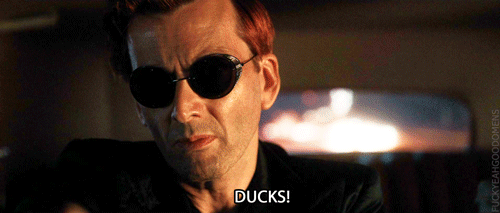
What's with all the ducks in Good Omens that Crowley seems to be inordinately fond of? Turns out, they do have a narrative purpose, they're not just in there as a running joke about Crowley's fondness for the animals of Earth.
They appear in both S1 and S2, and get mentioned in several seemingly random places. Like, really random. There are quite a few in St James Park, where the ducks live, where the international spies also clandestinely meet, where Aziraphale and Crowley meet on several occasions, and where Crowley and Shax have a meeting, exchanging information in S2E1.
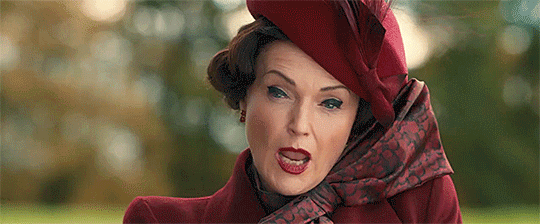
Ducks also get referred to here, when Aziraphale suggests they use humans to search and spy out the missing Antichrist, but Crowley insists it will be near impossible because suspicion slides off the boy like water off, what ever water slides off, because he has an automatic defense system.
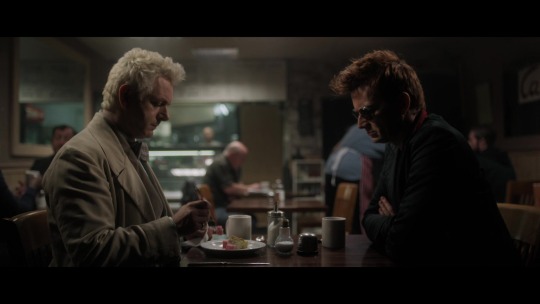
The he remembers the ducks(!) later in the Bentley when they discuss using their respective networks of highly trained human operatives (Shadwell and the Witchfinder army), and Aziraphale asks if Crowley has a better idea than his. "Ducks!" Crowley suddenly utters.
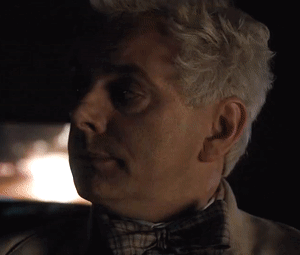
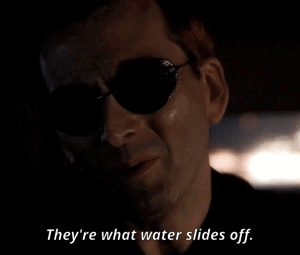
The ducks that are always there, that you see but don't see, gathering bread crumbs, when any kind of surveillance or secret spy work is being discussed.
Nah, I thought, it couldn't be a sly ref to this famous cartoon by Larson, could it?
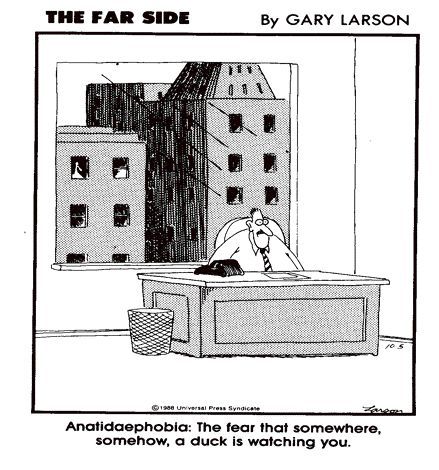
Aziraphale and Crowley are always afraid that someone is watching, or listening to everything they do, from both sides. I mean isn't that partly why we got the ending we did in S2, because they have had to be so covert with their communication to each over the centuries they've forgotten how to speak plainly to each other?
Heaven has definitely been watching...
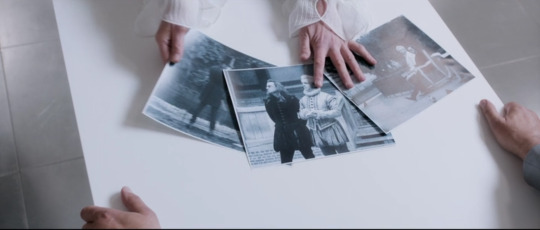
And Hell certainly noticed Crowley's act of kindness in the Edinburgh cemetery, swiftly summoning him to Hell for punishment after his kind deed on behalf of Elspeth.
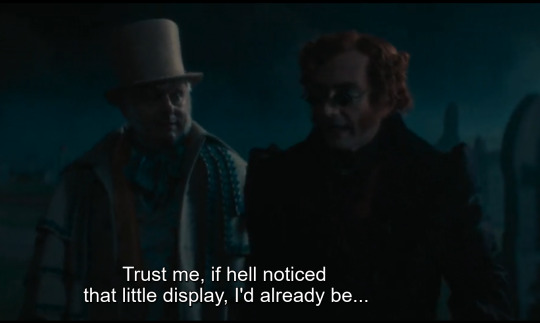
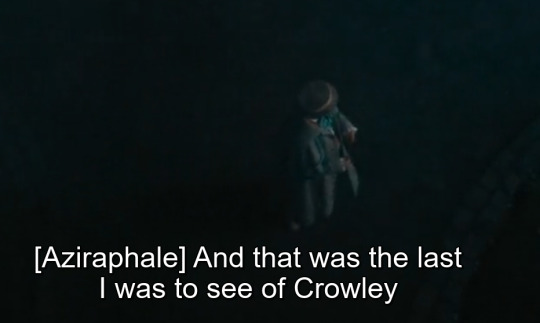
Then when the duo meet in again 1867 Crowley wonders if "ducks have ears" before declaring they must do - that's how they hear other ducks. So its no surprise that when Crowley asks Aziraphale for holy water that he writes the request on a piece of paper to hide it from those invisible ever-present watchers they know are never far away.
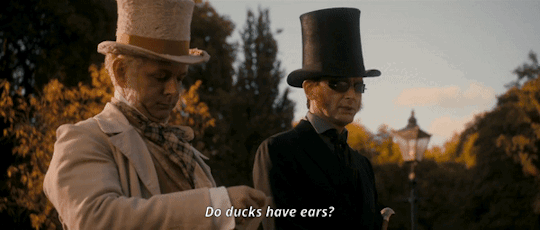
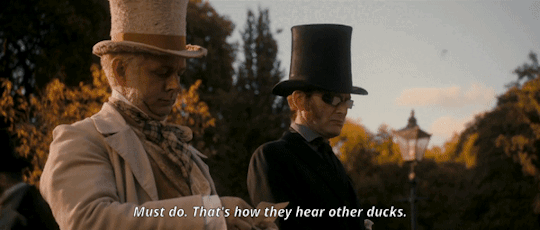
When we come to the start of S2, where Crowley is slouched in St James Park once more, reading the Tadfield Advertiser, and yelling at the Azerbaijani secret agents for feeding the ducks bread. Crumbs, it was alright to do this in the book, and S1, why is wrong now? Has Crowley suddenly become woke and caring for the ducks? Nah.
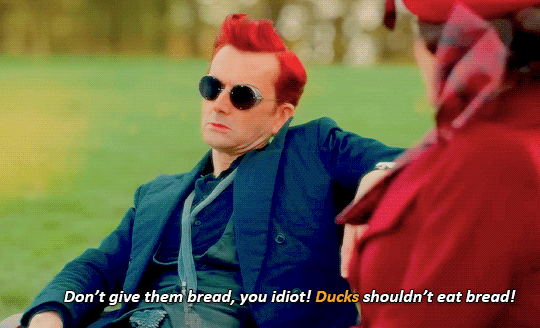
There's a lot more to it than that. I realized this is the missing Grain offering from my post about altar offerings (see The Altar of Eccles Cakes) in S2. A Grain offering represents a voluntary expression of devotion to God - or the other side you're supposed to be aligned with, in this case.
Shax is part of this scene, discussing the latest news from below, and she mentions some special intel that Hell has received, from their own secret squirrel network. Of course they would meet in St James Park to discuss this, along with all the other spies. While Shax tries to get some intel out of Crowley about what might be going on in Heaven, because she knows he has contact with a certain angel who owns a book shop, Crowley responds by refusing to show any devotion to his former side at this point, and isn't going to give any information away that could be useful. He also doesn't have any intel at this point, anyway, but he's not going to give that away either! Heaven and Hell are toxic, and no one should be going anywhere near them, in his opinion. So stop feeding them that devotional bread!
After Shax asks what they should be feeding the ducks, he eventually says "Frozen Peas. It's good for them, they like it."
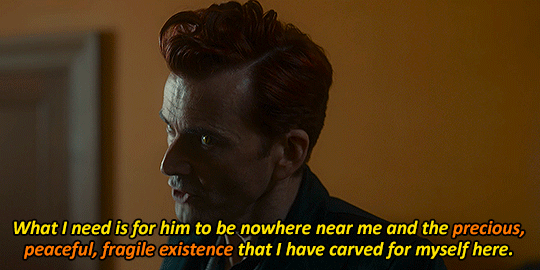
The short period of "peas" since they stopped the impending Apocalypse has been enjoyable, and good for Crowley and Aziraphale, but the forced meeting with Beelzebub later that day soon jolts Crowley out of any complacency when they indicate that the "generalized understanding" Crowley thought they had with Heaven and Hell after the body swap to leave them alone, the one Aziraphale-as-Crowley negotiated, while asking for a rubber duck, no less, was looking very shaky and fragile indeed.
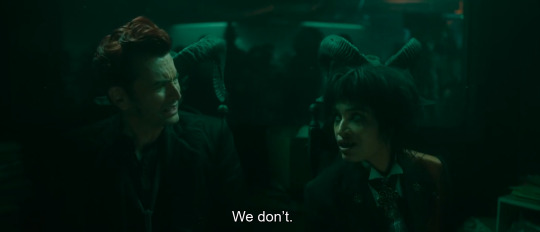
And one more random duck ref to discuss.
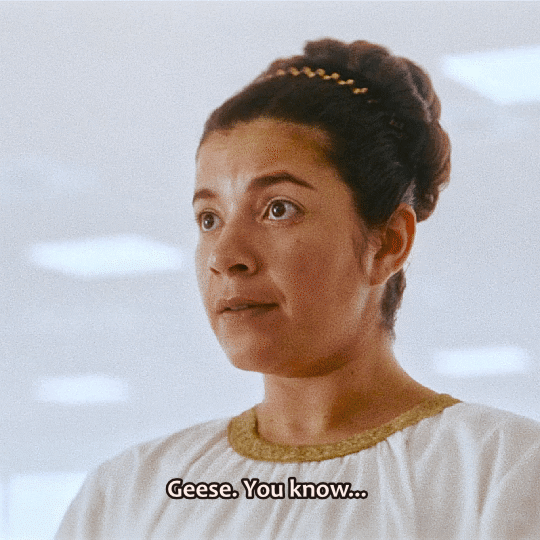
I was inspired to write this section by lalalunamoth's post calling Muriel a duckling imprinted on Crowley, and of course I did not save it, did I, and a search does not bring it back up again (found it!), so if you're reading this, or know that post, please let me know! I read it, and thought, cute, but nah, then realized that Muriel was sent on a surveillance mission to Whickber St to ascertain the truth of Aziraphale's 25 lazurii miracle. And she did act as the eyes of Heaven, writing up some reports, called Crowley "grice," then followed him around during his escapade in Heaven just like a duckling following a grumpy gander drake while he did his own surveillance measures in a Tactical Turtle neck, channeling his best imitation Sean Connery voice (have you noticed that as well, people?)
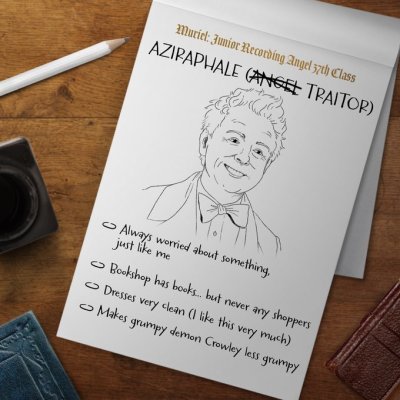

No, no, the op wasn't wrong - those big cross ducks, er grice geese, they make good guard dogs, no?
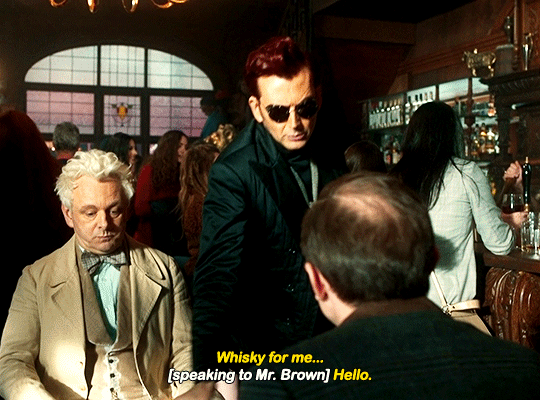
With special mention to Crowley acting as a surveillance duck just prior to this, and Mr Brown doing his own "spying out" of Aziraphale.
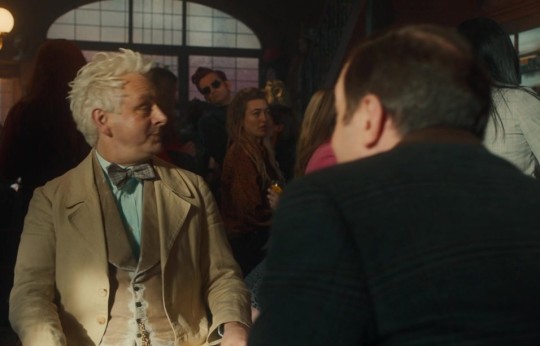
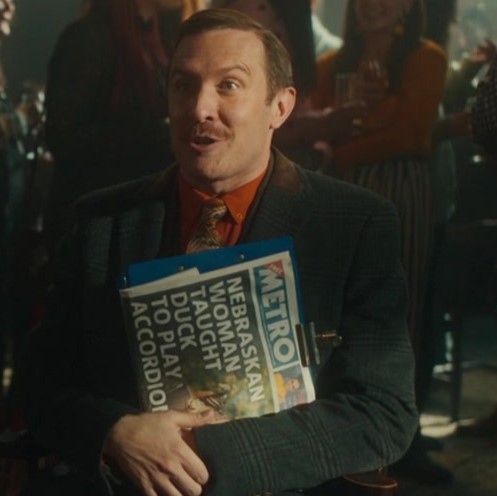
To finish this meta, there is one other figure who notably offered the ducks bread, in the book. This passage, which is surely relevant to S3, but didn't appear in S1, shows another character still devoted to God in a way. Lets give Death the final word:
Crowley: "Maybe it's it's all part of a great ineffable plan. All of it. You, me, him, everything. Some great big test to see if what you've built all works properly, eh? You start thinking: it can't be a great cosmic game of chess, it has to be just very complicated Solitaire. And don't bother to answer. if we could understand, we wouldn't be us. Because it's all - all - "
INEFFABLE, said the figure feeding the ducks.
"Yeah. Right. Thanks."
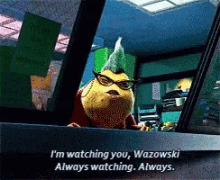
#good omens#crowley#aziraphale#shax#ducks!#ineffable bureaucracy#the fear that somewhere somehow a duck is watching you#Larson#always watching#frozen peas#grain offering#altar offerings#muriel#big cross ducks#witchfinder army#shadwell#tactical turtleneck#guard dog geese#grice#the pub#mr brown
487 notes
·
View notes
Note
Hey does everyone remember when Aang physically hurt Katara via burning her due to his own negligence with fire because he didn't listen at all to her concerns? But all of Katara's concerns were her being worried for him getting hurt and not herself, and then he hurts her badly, this never gets addressed again in the show, but I remember this vividly.
i actually like this scene on its own.
aang burning katara is a good character building moment because it's a brutal reminder of his own capacity for destruction. he needs to understand that his reckless actions can have horrific repercussions in order to fully realize the weight of his responsibility as both a firebender and the avatar, and it makes the moment where he uses zhao's recklessness against him more impactful. it also sets up the "water = life, fire = death" dichotomy that's part of katara's arc on viewing the world in binaries, which will later be broken down in book 3.
but ultimately the incident is still of greater significance to aang, and he's the one to bring it up in the guru and western air temple episodes, telling both guru pathik and zuko about his guilt over burning katara and his refusal to firebend ever again. this experience is also what leads him to accept zuko as his firebending teacher, and then finally forgive himself when he learns the true meaning of firebending. for the most part, it's a well-sustained arc and one of the few narratives aang has that is actually brought to completion.
do i wish that katara and aang had actually talked about his actions beyond this episode? yes. do i wish the aftermath had been focused a little more on katara instead of showcasing the impact of her physical injuries mostly through aang's continued self-flagellation? yes. but as a one-off incident contained to a single episode, i don't mind it.
what i do mind, however, is that this is not the last time the show is going to use katara as a lynchpin for aang's character development.
in the book 2 premiere, katara is turned into a pawn to propel aang into the avatar state. in the guru, her imprisonment is the reason that aang chooses to go back to ba sing se instead of unlocking his chakras. that is three separate times now that katara has been damselled in order to facilitate key turning points in aang's narrative, but not once does the same apply in reverse. there is never a moment where aang is the only one put in danger solely to drive katara's arc, the way she is in his. the closest we get is katara bringing aang back to life, but even then his death is still the result of his own choices and more integral to his storyline than hers.
now, compare this to the final agni kai.
at first glance, katara being put in danger just to complete zuko's redemption looks like the same tired trope, and had the scene ended at his sacrifice, it would be. but crucially, it's katara who continues the fight. katara who defeats the scion of fire nation destruction at the height of her power. katara who saves zuko just as he saved her.
in proving herself a master waterbender powerful enough to defeat azula and save someone she loves - someone who sacrificed themselves for her - from fire nation aggression, katara brings her own arc full circle. it is in triumphing over azula by saving each other that zuko and katara become the people they were always meant to be, and so their individual arcs are brought to their narrative culmination through bookending the other. the final agni kai works where the kat.aang moments fall short because it is of equal significance to both zuko and katara's narratives.
obviously, this is not to say that it's bad for certain characters to exist just to drive another character's arc. it's inevitable that some will be written solely to fulfill that purpose because a story only has so much narrative space, and it usually can't - and shouldn't - be divided equally amongst every single character.
but if we're talking about two main characters who end up in a lifelong romantic relationship, and it's the female character being repeatedly damselled to drive the male character's storyline within an already imbalanced dynamic... perhaps it's time to rethink a few things.
279 notes
·
View notes
Text
You know what.
Yes, Lucien DOES deserve Elain and he DOES deserve a mating bond.
And all this weird fake choice rhetoric and pseudofeminist takes are tired and some of the most superficial ways to interpret the text I've seen. "Elain deserves a choice" as if SJM hasn't written every single character with a mating bond having a choice and deliberately has set up a cultural system around bond acceptance where it's totally in the female's hands to accept or reject. As if she hasn't had Lucien being the LEAST entitled male with a bond in this series. He hasn't forced her into a bargain or locked her in a house with him.
But I digress. Lucien and Elain are characters in a fictional story. The narrative is what drives everything. Unlike in the real world, we can openly discuss who "deserves" certain storylines and wish happiness or misfortune to characters because they're not real people and fiction is all about the story that is being told. There is a sense of justice when it comes to love because we are reading romances. This isn't just about "omg one character likes another" Its about telling a bigger story of who is right for each other, even if they aren't ready to see it yet (like every single romance she writes about). SJM purposely gave Lucien a tragic romantic backstory that is absolutely devastating to think about. She made him think he lost his mate and turn his back on love only to find out his mate isn't who he thought it was and it's the only thing narratively that makes sense for his character to give him a chance at love again. She purposely made Elain experience a horrible rejection because of things done to her outside of her control by a man she thought could love her unconditionally. So it makes sense that the guy she will end up with will actually be the one who is actively showing he will love her without conditions - rather than the one who is not even willing to admit he's not over another female or that he has considered Elain beyond his sexual fantasies. And who of course tapped out the second he was met with any resistance.
So yeah, when I say Lucien and Elain deserve each other and to have a soulmate who loves and accepts them, I mean it with my whole chest because that is what would be satisfying to the narrative. Settling for mediocrity is boring in a world where you could have it all. And the whole point of even reading these books is to figure out how and when X character is finally going to realize they can indeed have it all.
Like honestly I don't think anyone should shy away from telling people straight to their face when they say "oh so you think Lucien deserves Elain???" That yeah. I absolutely do. What of it?
317 notes
·
View notes